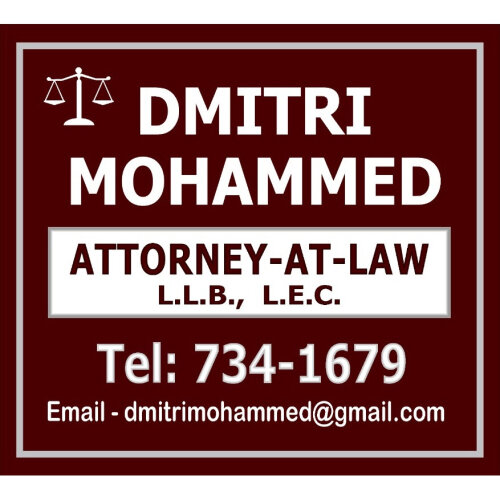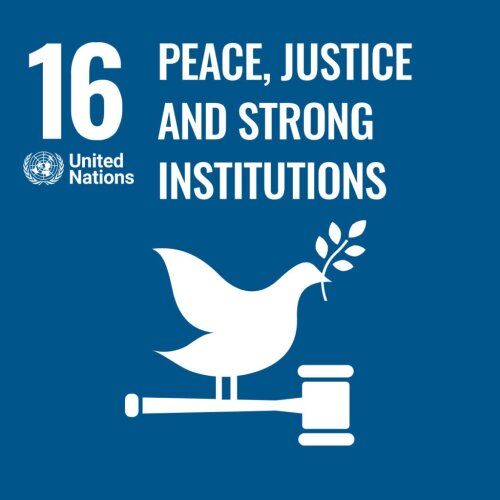Best Mortgage Lawyers in Trinidad and Tobago
Share your needs with us, get contacted by law firms.
Free. Takes 2 min.
Free Guide to Hiring a Real Estate Lawyer
Or refine your search by selecting a city:
List of the best lawyers in Trinidad and Tobago
About Mortgage Law in Trinidad and Tobago
In Trinidad and Tobago, a mortgage is a legal agreement through which a borrower grants a lender the right to property collateral as security for a loan. Mortgage law primarily governs the rights and obligations of the involved parties in this agreement. The local legal framework ensures the protection of both borrowers and lenders, facilitating fair transactions in the real estate market. Understanding mortgage law is critical to ensuring that both parties meet their legal obligations and exercise their rights effectively.
Why You May Need a Lawyer
Navigating the complexities of mortgage agreements can often require professional legal assistance. Here are some common situations where a lawyer’s help might be necessary:
- Reviewing and negotiating the terms of a mortgage agreement to ensure protection of your interests.
- Handling disputes between borrowers and lenders regarding payment terms or breach of contract.
- Providing advice on foreclosures and strategies to prevent losing property.
- Assisting with refinancing or modifying existing mortgage agreements.
- Navigating issues related to property title or mortgages inherited through estates.
Local Laws Overview
The mortgage law in Trinidad and Tobago is shaped by several key pieces of legislation and principles:
- The Real Property Act: Governs the registration of land and dealings in land, important for securing a mortgage against a property.
- Conveyancing and Law of Property Act: Details processes related to the sale of property, including mortgages.
- Consumer Protection Standards: Influence terms related to mortgage lending and borrower’s rights.
- Judicial Precedents: Case law from local courts provides guidance on complex disputes and interpretations of mortgage agreements.
Frequently Asked Questions
What is a mortgage?
A mortgage is a type of loan specifically for the purchase of real estate, where the property itself serves as collateral.
How does the mortgage process work in Trinidad and Tobago?
It involves applying for a loan from a bank or lender, and upon approval, the borrower agrees to repay the loan over time with the property serving as security.
What is required to qualify for a mortgage?
Typically, lenders will assess income, credit history, and the value of the property. Proof of finances and legal documentation will be required.
What happens during a foreclosure?
If a borrower fails to make mortgage payments, the lender may initiate foreclosure to sell the property and recover the outstanding debt.
Can I refinance my mortgage?
Yes, refinancing to get better terms or rates is possible, but it often requires formal application and approval from the lender.
Are interest rates fixed over the life of the mortgage?
Interest rates may be fixed or variable, depending on the terms agreed upon in the mortgage contract.
What fees should I expect with a mortgage?
Common fees include processing fees, legal fees, valuation fees, and stamp duties, among others.
What rights do I have as a borrower?
As a borrower, you are entitled to clear information about your mortgage terms, reasonable interest rates, and fair treatment in processes like foreclosure.
Can I transfer my mortgage to another property?
This may be possible with lender approval and is subject to specific conditions and legal processes.
How can a lawyer assist in the mortgage process?
A lawyer can help with document preparation, negotiations, legal advice, and representation in case of disputes.
Additional Resources
Those seeking further information and assistance may find the following resources useful:
- Ministry of Legal Affairs: For information on real estate laws and property registration.
- Central Bank of Trinidad and Tobago: Provides guidelines on lending and financial regulation.
- Registrar General’s Department: For property title and registration services.
- Trinidad and Tobago Mortgage Finance Company Limited: A lender offering various mortgage products.
- Legal Aid and Advisory Authority: Offers legal advice and assistance for those who qualify.
Next Steps
If you require legal assistance with a mortgage in Trinidad and Tobago, consider the following steps:
- Identify the specific issues or questions you have regarding your mortgage.
- Prepare all relevant documents, including your mortgage agreement and financial records.
- Contact a licensed attorney specializing in real estate or mortgage law.
- Schedule a consultation to discuss your situation and obtain legal advice.
- Consider options presented by your lawyer, including negotiation, mediation, or court proceedings if necessary.
Taking active steps to understand your rights and obligations can significantly impact your financial well-being and property security in mortgage matters.
Lawzana helps you find the best lawyers and law firms in Trinidad and Tobago through a curated and pre-screened list of qualified legal professionals. Our platform offers rankings and detailed profiles of attorneys and law firms, allowing you to compare based on practice areas, including Mortgage, experience, and client feedback.
Each profile includes a description of the firm's areas of practice, client reviews, team members and partners, year of establishment, spoken languages, office locations, contact information, social media presence, and any published articles or resources. Most firms on our platform speak English and are experienced in both local and international legal matters.
Get a quote from top-rated law firms in Trinidad and Tobago — quickly, securely, and without unnecessary hassle.
Disclaimer:
The information provided on this page is for general informational purposes only and does not constitute legal advice. While we strive to ensure the accuracy and relevance of the content, legal information may change over time, and interpretations of the law can vary. You should always consult with a qualified legal professional for advice specific to your situation.
We disclaim all liability for actions taken or not taken based on the content of this page. If you believe any information is incorrect or outdated, please contact us, and we will review and update it where appropriate.
Browse mortgage law firms by city in Trinidad and Tobago
Refine your search by selecting a city.















